When Greek Café-Culture Haunts a Mystery (& another Detective Grigoris Anti-Excerpt)
Sometimes, it’s all about atmosphere, travel, and honoring what made the past special
Last month, when I announced my completed Detective Grigoris novel, I also noted a new season of behind-the-scenes stories. Today is the first. It offers a unique glimpse into one such case: Loxias, a former café-ouzerie-bookshop in downtown Thessaloniki that I patronized for years from the early 2000s on the advice of a friend who’d been going there since the late 1980s.
Loxias was a cozy, friendly and eclectically-decorated shop with a dignified and charismatic owner, and differed from the more generic cafés in town. Its walls (and for a number of years, basement shop) attested a deep love of learning and book culture.
I liked Loxias, and highlighted it when co-authoring four successive Lonely Planet-Greece travel guides, from the edition of 2008 through to 2014. Somewhat later I visited and was sad to find the shop had changed hands. While there was indeed still a café in the same building, the name had been changed, as had the décor; it was just another average place, no more the home of a certain sort of eclectic literary-minded group that might be a good setting for scenes from a Greek detective novel.
Of course, I did not have plans for a detective novel then. But in 2021, when at last the idea came to me, Loxias was the obvious setting for a few of the detective’s important briefings in Thessaloniki—though the fellow he meets there would have been a rather improbable guest, in the real days of the old Loxias.
Perhaps ironically, given the genre, some quick Google searching now turns up different results in reviews and names, indicating that another café of the same name may have opened a few doors down, while some excerpts of anonymous reviews seem reminiscent of my own guidebook text—in describing a current place that might not even be the same as the one I visited all those years ago.
A Poetic Aside
Today’s post also ties in nicely with a poem I published on 1 February 2024, entitled ‘The Vacant Bookshop’s Haunting.’ As I explained soon after then, I would explain in September (okay, I am off by a few days) in another way, a part of the inspiration behind that poem. Today’s post, the above reflections and below republished 2006 travel piece, comprise a part of the inspiration behind the poem.
Loxias: A Travel Article Republished
Note: The following article, written by Christopher Deliso and titled ‘A Spirited Bookshop in Thessaloniki,’ was originally published on 24 August 2006 on my former Balkanalysis.com news website. The photos were taken by the author inside Loxias in 2004.
A Spirited Bookshop in Thessaloniki
By Christopher Deliso
No doubt, Thessaloniki, Greece’s de facto cultural capital has no shortage of fashionable cafes and nightspots. But beyond going out merely to drink or be drunk, to see or be seen, is it possible to feel the convivial spirit of an ancient land, world-famous for its legacy of feasting, the arts and philosophy?
Indeed there is! Tucked in a back lane right in the heart of Thessaloniki, a welcoming bookshop, Loxias, celebrates almost three millennia of Greek literary offerings in its well-lit book cellar. Upstairs, where the cafe is located, a cozy interior overlooks Roman ruins in the backyard. The walls are lined with turn-of-the-century photographs, and voluminous barrels of wine greet the visitor.
Yet while it serves all manner of drinks, from espresso to beer, Loxias is most distinguished for being an ouzerie-bookstore — a book lover’s haven that can also be celebrated by late-night lovers of Greece’s spirited, diminutive national drink, ouzo.
The owner of the shop, the good-natured Ioannis Kiprianidis, sums up the special atmosphere that has developed in Loxias since he opened it in 1987. According to the 60-year-old former student of pharmacy, previously engaged in the bookshop business in Italy, Loxias “recognizes the banquet mentality of the Greeks, by which the motto, ‘eat, drink and philosophize’ comprises our tradition.”
Loxias now boasts, along with its occasional visitors, a loyal extended family of intellectuals, sybarites and armchair politicos. On any given night it might be crowded with gesticulating Greeks arguing about a medley of topics ranging from Aristotle’s categories to theater to the latest pronouncement of Karamanlis.
Here, laughter and animated banter predominate amidst smoky iterations of the latest national political duplicity or an exposition of ideas, or just the occasional friendly gossip.
And then there is, finally, the quietude of the shop’s romantic corner on the miniature backyard balcony, overlooking Roman ruins where cats flit in the dusk.
For Kiprianidis, Loxias is a “steki’- an affectionate Greek word meaning something akin to a “local,’ yet somehow more personal still. It is a place, he attests, for “enjoyment and spiritual pleasure, an alternative to the usual cafés with their cards, smoking and televised nonsense!”
Regular customers feel themselves as part of the Loxias family. Dr. George Karamanolis, a professor of ancient philosophy at the University of Crete, recalls what first drew him to the shop way back in 1989, when he was a student in Thessaloniki.
“The first thing I appreciated was that it stayed open until late at night,” he recalls. “The owner seemed to be living there all the time. I sometimes found it open even when coming back from a bar at 3:00 in the morning!”
And not only was it open, says George; the cafe was also “full with people who were having vivid discussions about politics, the identity of modern Greece, books, ideas, and so on. Ioannis always came to welcome you and to talk to you, often getting you involved in the discussion too. I hadn’t seen such a bookshop before. It didn’t just sell books, it housed ideas and arguments about books, from people who loved books… it did not take long for me to become a frequent client or, better, a friend of the bookshop.”
Indeed, while Loxias is unique for being Thessaloniki’s first bookshop-cafe, it has a deeper significance.
Loxias is remarkable for many reasons, but most of all in that it upholds something that has almost vanished from Greek society today: the venerable old tradition of the bookshop as a cultural center for discussion and debate, presided over by a cultured patron of learning and the arts.
The figure of the erudite bookseller – a cerebral purveyor of literature who would not only know what books he was selling, but also know their contents, inside and out – is a long attested character central to the old Greek culture. It is this sense of bookselling as a vocation, and not just a job, that is in danger of being lost today.
“Some thirty or forty years ago, Thessaloniki had a very lively bookshop culture,” says Ioannis. “Back then, there were excellent, learned vivliopoleis (booksellers). There was an established culture, one that was meaningful in its own right…
Today, the city is full of newer, bigger bookstores, but unfortunately, most of the old expert booksellers no longer remain. Some retired, others died. And, as everyone knows, there was a society-wide replacing of books by television, video games, etc… and little by little, the role of the traditional bookshop waned.”
For Ioannis, today’s one-dimensional, consumerist world of easily dispensable toys, techno music and soulless technology is utterly alien to what he experienced growing up. “It was very different when I was a boy,” he says.
“When I held a book for the first time, I would always revere it as a very special thing, something to take care of, to love- a really big gift. No one thinks that way anymore. Now it’s like a game or just another product. It doesn’t mean anything for them anymore.”
With the advent of the internet, and today’s fast-paced and competitive lifestyle, people neither have the impetus nor the time to read real physical books much anymore, the vivliopoles concedes. It is with good reason that Ioannis considers himself as “someone of the last generation.”
However, when he is feeling optimistic, the bookman (and others) see his cozy little shop as something that might help to stem the tide.
“There has to be some kind of a jump, a spiritual shift if we are to have a younger generation of book lovers,” he says. But this valuable aspect of Loxias has been attested. Indeed, the erudite scholar and author Dr. Karamanolis attests, “it may just be largely due to this place [Loxias] that I have come to love books and ideas so much.”
Even though it is a tidy little shop, Loxias does have a massive collection of Greek works, from the time of Homer and Hesiod up to the current day.
Rows are neatly arranged according to title, festooned with the odd picture of Nietzsche or ancient Greek masks. Everything, even the most obscure treatise examining, say, Byzantine campaigns in Armenia can be found here.
At the same time, Loxias’ books also celebrate the progression of the Greek language, from the literary heights of antiquity and 5th century Classic Attic, to the Koine of the Roman Empire, the Byzantine vernacular of saints and the stilted anachronisms of their bishops, and the modern katharevousa (‘clean’ Greek, unsuccessfully introduced and based on ancient grammar) and demotic that followed it alike.
The only drawback, as far as foreign visitors are concerned, is just this- the language issue. All of Loxias’ books are in the native tongue. Thus those who don’t read Greek will probably not end up bringing anything home, other than the warm glow that comes with wine, beer and raki (though there are some lovely photo books of Greece and its islands).
The sort of works sold here are well bound, whether soft or hardbacked, pocket-sized or for the coffee table, yet always dignified- that is, not exactly the type to be international bestsellers.
However, after a few glasses of Greek spirits, everything becomes possible. Ioannis jokes, “all Greeks drink, but not all of them read- however, when they get a little bit drunk, and they see the books- ah, that can be that moment of passion when they get inspired to buy one!”
If you go: Loxias is located in downtown Thessaloniki, at 7 Isavron Street. It is easy to find from the central Plateia Navarinou, a long pedestrian street that runs from the Arch of Galerius at Kamara down to the busy shopping street of Tsimiski.
Just walk down the Plateia towards the sea, and Isavron will be on your right- a small side-street just before Tsimiski. Loxias is halfway down on the right.
The bookstore is coming off of summer holidays and is currently open every day after 6:30 PM- just fine for nocturnal Greeks and visitors alike.
…………………………..
FROM THE CUTTING-ROOM FLOOR: AN ANTI-EXCERPT FROM DETECTIVE GRIGORIS, CHAPTER 5
As with last month’s post, I’m presenting another piece of text that had to be squeezed out and rewritten from the 26 January first version of the book, because it was just too long and could be retold in a better way. While this excised text was set in Loxias, fear not! There are several other additional scenes from the café that did make the final cut. I hope you enjoy it.
-ANTI-EXCERPTC5-
Grigoris nodded his head dumbly, as if he couldn’t hear the commodore’s tirade, though the big man was loud enough, despite the record player that the ouzerie owner Georgios had dutifully just turned up at the commodore’s request. It was more rembetika, the Greek sort of blues, and the military man seemed mournful. The latter motioned vigorously and soon more ouzo and another plate of mezedes were on their way to their little corner table overlooked by an etching of bygone Montenegrin royalty.
God, Grigoris thought with annoyance, I suffered all the way through the late-night church service just to get him safely from there and back to his favorite place, and still this thick-headed fellow won’t stop complaining about China.
And yet it was true.
“Have you completed the research assignment I gave you?” the commodore ordered, while clumsily dropping the ice with tongs into the poured ouzo. “About the Greek national-security strategic assessment for the greater Black-Sea region?”
“Not really,” said the slacker-detective sheepishly. “I’ve been… busy. But I agree with you about China”—
“China?” roared the commodore, his big fist smacking the table, almost upsetting the halfhearted bottle of Plomari, and causing some nearby patrons to look over with amusement. “Do you know how much damage that speech from the American commerce secretary made after the Thessaloniki trade fair? About ‘reforming’ our national legislation, to retire our vessels after 25, even 20 years? Just because of this one incident? If they do that, you can be sure they will hand the whole country over to the Chinese! There’s no one else with the shipbuilding capacity left! And once they’ve taken all the loans for the Greek fleet, it won’t be long before they come to seize the ports! ‘Chinese water-torture,’ it will be called!”
Grigoris, admirably absorbing the commodore’s voiced broadside in peace, simply shook his drink and bit into smoked pork and cheese. There was nothing he could do about either the commerce secretary’s unfortunate speech, or the shipping disaster, or whatever the government might do with its legislation. He did, however, have a more pressing concern.
“I agree,” he said diplomatically. “But that is beyond me to fix. Tell me, have you heard of any news from our… friend—you know, about the counter-terrorism investigation? Now there is something I could”—
“Nothing at all,” grumbled the commodore, pausing to adjust the hair on his broad face in one of the café’s elaborate wall mirrors. “She’s gone silent as the tomb. Like my son, Kostas. Still no word, after all this time.”
“Don’t worry about him,” replied Grigoris. “I’m sure he’ll make contact. It’s just sometimes—that reminds me. I wanted to ask you about the idea of making a joint pilgrimage.”
The commodore lifted his large head and stared intently through ouzo-soaked eyes at the young detective. Now it was his turn to appear dumb.
“What… pilgrimage?”
Grigoris just smiled. It was the moment for which he had prepared, and on which everything would depend in his plan for clarification.
-END ANTI-EXCERPTC5-




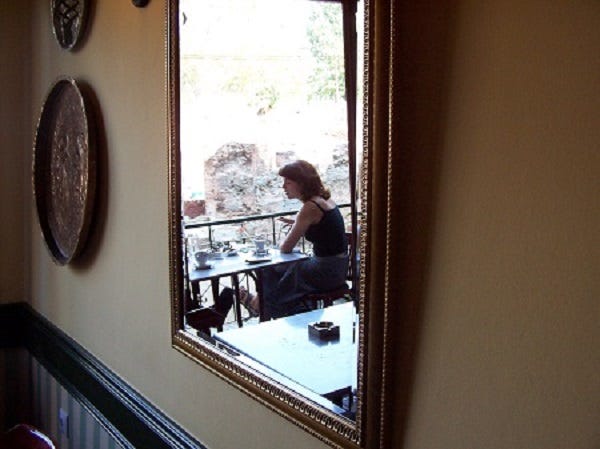
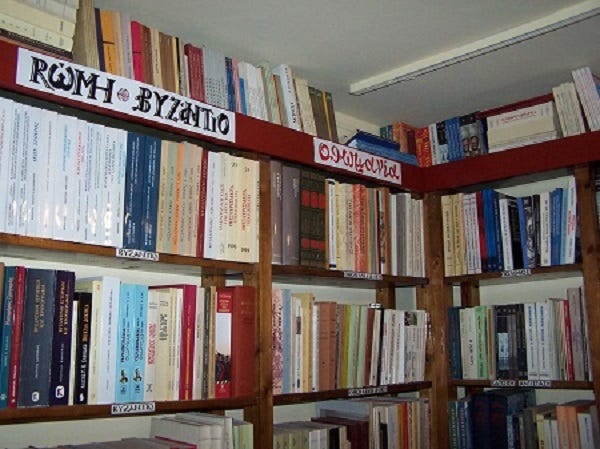
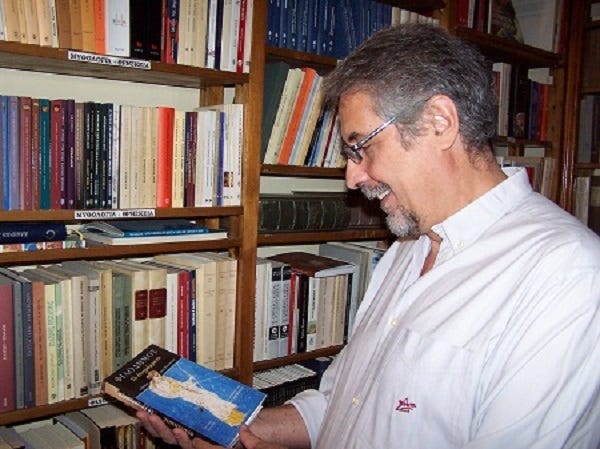
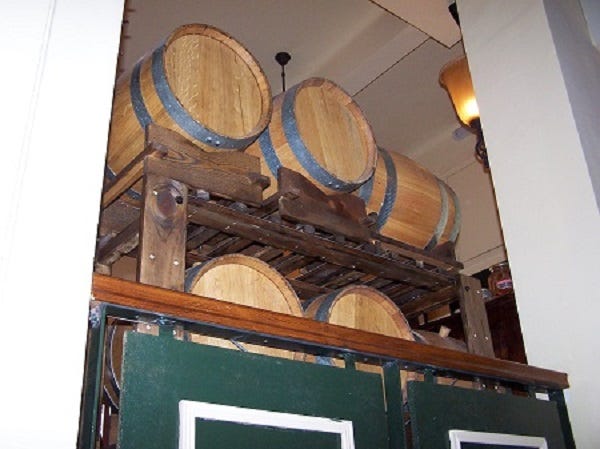
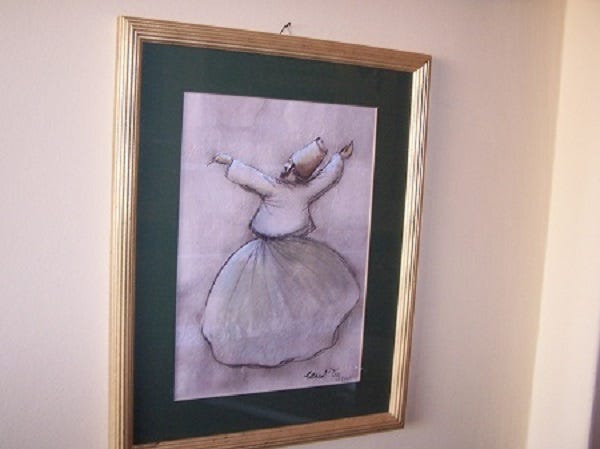
That made me nostalgic for all the old bookstores I used to shop at. I hope they're still around... Wish there was a good one nearby now!
There are still a few book stores in business where I live. I am now encouraged to visit them, Amazon be dammed.